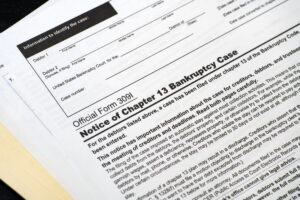Once your attorney files your Chapter 7 bankruptcy petition, a bankruptcy estate is created. Included in the estate is any property that you own.
If you acquire any property after your case has been filed, you may have to report it to the bankruptcy trustee. One example of such property is if you inherit any property within 180 days of filing your case. If you fail to report any property you receive after you file your case, your Chapter 7 discharge may be revoked.
Section 727(d)(2) of the Bankruptcy Code states that , “[o]n request of the trustee, a creditor, or the United States trustee, and after notice and a hearing, the court shall revoke a discharge granted under subsection (a) of this section if …the debtor acquired property that is property of the estate, or became entitled to acquire property that would be property of the estate, and knowingly and fraudulently failed to report the acquisition of or entitlement to such property, or to deliver or surrender such property to the trustee.”
If you receive any property after you file your petition, and before your discharge has been granted, you should talk to your attorney right away, so that she can determine whether or not the property should be reported to the trustee.


